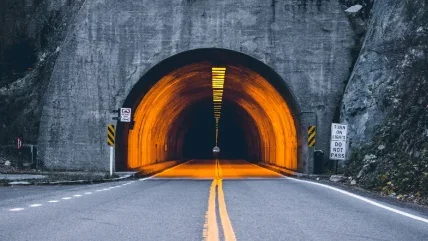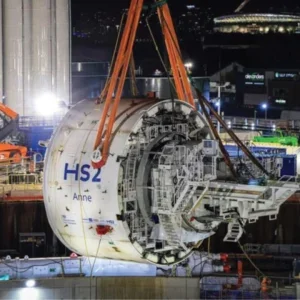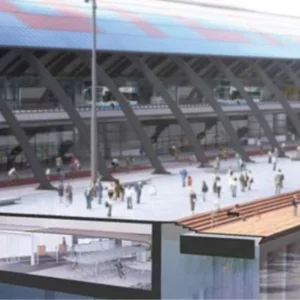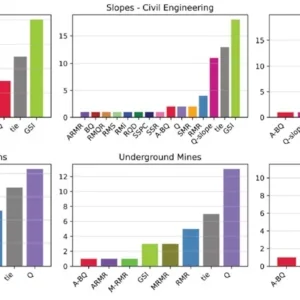
Contrary to the norm, the meeting started with a vote. Kate Cooksey, Chair of the BTS Young Members and host of the meeting, asked for a vote to judge the current feeling on the subject. A show-of-hands judgement was a 60/40 split against the motion – that this house believes that the UK tunnelling industry has sufficient range of engineering expertise and resources to meet the challenges of future projects.
Speaking from an experienced construction and design point of view, semi-retired Neville Harrison (Consultant) presented the historic perspective as seconder for the motion, stating that modern tunnelling began in the UK. From the time of building canals to support the industrial revolution, to building of the railways and the earliest sewers, and from the Brunel’s first subaqueous Thames Tunnel endeavour, British engineers advanced development of shield tunnelling; introduced cast iron and precast cast concrete segmental linings; invented and patented early slurry tunnelling systems; and established the specific profession of bored tunneling with in civil engineering. This was out of a need to get the tunnel job done in the first instance, argued Harrison, and with tunnelling engineers from the UK finding employment on some of the largest tunnelling projects around the world.
As stated by all the speakers, Harrison was first to site the damage of project inconsistency but argued this in a positive spin. He acknowledged that a lot of lessons learned were lost during the tunnelling industry drought of the 1970s and early 1980s but that “during that time we were busy exporting expertise around the world – to Singapore, Hong Kong, North America, Australia. In Cairo, for example, where UK construction and engineering companies were building the deep sewer tunnels, we convinced the
French companies working at the same time on open cut construction of the city’s first metro line that tunnelling was the way to go and open cut for the metro hasn’t been used again. In the same way, said Harrison, “the UK profession has been quick to adopt and adapt international developments, such as SCL techniques and robotics, to suit our needs.” A more constant programme of tunnelling work by major agencies and government would be more efficient, he said, “but we have always been able to react to the workload, drawing back British engineers working overseas and attracting foreign engineers, contractors and workers to meet the challenges as they arise.”
Opening the cause for the opposition, Jon Banyai ((Mott MacDonald and Chair of the BTS YM Support Group) first acknowledged that Harrison “had 20 years of experience before I was born” and that it was a “cheek” to suggest that he was wrong, “but Neville is wrong”. Banyai explained how, of his class of civil engineering graduate from University College London in 2001, only a handful were UK citizens; only 20 of the 80 graduates stayed in UK engineering, (most attracted to lucrative careers in the City); and that only two are known to be working in tunnelling today. “This followed the dire situation of the recession of the 1990s when there were fewer students in civil engineering and when engineering schools, departments and courses were shutting down.” This has led to a serious generation gap, said Banyai, a gap that is being filled by either older engineers, younger engineers, or engineers from abroad. Older engineers “could have a job until you die” he said, but “you are more experienced; more expensive; maybe less motivated to fill the generation gap themselves; and are often too busy to train younger recruits”. Younger engineers are “less experienced, less expensive, more risky, and likely to go about reinventing the wheel if not taught the old methods.” Recruiting from abroad “is not a long term strategy” and in fact, not only are foreign graduates going home, young engineers are being “coaxed away from the UK to places with better weather, more attractive standards of living, and better recognition of the engineering profession”. He ended with a plea; to accept there is a generation gap and to make available resources and funds to get the experience and knowledge out of the heads of the older engineers to help the younger engineers be successful in their tunnelling careers.
Proposing the motion, Harnaik Mann (Arup and Vice Chair of the BTS YM) opened by championing the BTS Young Members as an “enthusiastic crop of young engineers bringing in fresh blood to the industry”, including “a growing cohort of women engineers”, and said that there is no such thing as a ‘UK industry’. “The tunnelling industry has been global for some time and just as other markets, including Far East, Australasia and the Americas, have drawn in resources from the international pool when needed, so can the UK, by keeping our market open and competitive. Joint ventures formed with ‘foreign’ firms on projects such as CTRL and Crossrail have shown this”. In addition to mentioning the UK’s “world class research”, he also supported the idea of a national infrastructure bank that would operate much like the European Investment Bank to divorce infrastructure spending from politics and allow strategic planning of major projects to avoid peaks and troughs in the workload.
Seconding for the opposition and speaking from the contracting sector of the industry, John Edwards (Morgan Est) agreed that “Brits have been very flexible in the past” but “have we stretched the elastic too far this time?” He stated that the British effort for the Channel Tunnel in the late 1980s drew in foreigner resources to fill gaps in the UK industry and after large water schemes and the Jubilee Line Extension in the 1990s, pressures on UK resources eased until CTRL and cable tunnels and others increased them once again in the mid- 2000s. Foreign resources were relied upon once again to meet the demand and the lack of younger engineers coming through the ranks in the UK industry was increasingly apparent. “We are once again in a downturn but with a tremendous workload ahead of us. In the London area alone these include Crossrail; Thames Tideway and its Lee Tunnel starter contract; London Underground disability access and upgrades at Victoria, Tottenham Court Road and Bond Street Stations; along with more National Grid and electricity cable tunnels. Nationally there is the Preston and Brighton stormwater projects and an intense programme of nuclear power station construction in development. This represents about £9 billion of pure tunnelling work in the immediate future. This is a quantum leap when you consider that demand over previous years has been about £200-300 million per annum.”
Edwards concluded by making three salient points.
• “Our clients still do not appreciate the limitations on our resources and the current peak is being exacerbated by the on-going delay in awarding contracts.
• Modern legislation, client requirements and bureaucracy place far greater demands on the number of engineers needed on any particular project.
• Several coming projects including Crossrail, “involve a high volume of SCL work that is particularly demanding on quality engineering expertise”.
At this point, the debate was opened to comments from the audience.
Mike McConnell, Retired contractor:
“I will be voting against the motion. The UK will need to joint venture with internationals to get the coming workload completed.”
Paul Glass, Kier: “There is no way we can admit that we don’t have the resources to get the projects completed. The motion doesn’t say that resources and expertise have to be UK sourced. We can get resources from anywhere in the world. Resources are not all about people but also about technological capabilities which reduce the manpower needs in modern projects.”
John Edwards: “We shouldn’t want to admit it, but many here are 10 years from retiring and others are already 10 years into retirement. The Crossrail Academic Forum is established to address the problem and get more people involved in tunnelling.”
Philip Moore: “Contractors have the biggest stretch. The government should be worried. Tunnelling is an international industry and that operates as a reversal of talent as well.”
Lacy, Balfour Beatty: “Like Brunel and others of the past, engineers today need to be more flexible, going from bridges to tunnels to other civil projects. European civil engineers are more flexible. Can it be the same over here?”
Harnaik Mann: There is definitely scope for structural and geotechnical engineers to bridge the gap (the last BTS Harding Prize winner started as a structural engineer). We shouldn’t be looking in narrow terms at just tunnellers; other disciplines will rise to the challenge as well.
David Kellett, Hunter Personnel: “We have about 28,000 people on our books looking for placements. Of these 14,000 are mining engineers and about 5,000 are tunneling engineers. Of these less than 6% are under the age of 30. The level of risk to be shouldered by tunnelling engineers is also high. That’s not the same in banking.”
Tim Harman, Costain: “We have lost engineers and if contractors are not hiring, nobody is coming into the industry.”
Neville Harrison: “Get the jobs going and that will attract people. I suspect that resources will fit the demand. We have a 10 year time frame to work with and should schedule the work load accordingly.”
Kate Woolley, Mott MacDonald: “What about pay? It’s not enough for attracting young engineers.”
Colin Mackenzie, Retired constructor: “There could be an 8-10%increase in pay for engineers without a dramatic impact on the cost of tunnelling.” (SW – This comment needs checking)
Helen Nattrass, Robert McAlpine: “Engineers are problem solvers. As a young engineer I became involved in tunneling when the company I worked for won a tunnel contract unexpectedly. It was baptism by fire, but I got on with the joband quickly became familiar with the new work. All our young engineers are problem solvers, and I believe that, even without prior specialist experience they will step up to the mark should they become involved in tunnelling work.”
Matt Sykes, Arup: “We are doing youth a disservice. Things have changed. Yes there is more risk involved. Yes we are relying on the experience of older engineers, but the project director of the new HSBC Bank building in Hong Kong was 32. I have great faith in the confidence of young people, great faith in the young members of the BTS, and great faith in the older members to support them. I am for the motion. We will have sufficient range of engineering expertise and resources to meet the future challenges.”
Summations and vote
Spirited discussion was called to a close with John Edwards summing up for the opposition. “The opposite team have argued our case. We have “muddled through” in the past. We do have a great history and technology has, and will continue to reduce labour needs, but we are losing the lessons learned by the lack of new recruits into the industry. There are plenty of foreign engineers but are they part of the UK industry? There is not the resource in the UK at the moment to face the tremendous workload in the immediate future. Vote against the motion.”
Harnaik Mann closed for the motion. “Take a look around the walls of the room for a moment. The names of Brunel, Bazalgette and many others would not be here if they lacked faith in the industry and decided to give up. What if a young engineer took the same attitude in their civils interview? Is pessimism the hallmark of a chartered engineer? If you don’t support the motion, then perhaps you might like to sign this petition? It tells the government to bin Crossrail and HS2 because BTS hasn’t got the conviction to see these through. We are a profession of problem solvers, and have achieved great things. Conditions aren’t ideal, but we are excellent at our jobs. Support the UK tunnelling industry and vote for the motion.”
After a show of hands, Chair Kate Cooksey declared the result as slightly less against the motion, the gap having narrowed from the vote at the start the meeting to about 55/45. Two things missed was to get some idea of audience numbers in the different age groups; and to record a demographic split for those who voted for and against the motion. That too would have contributed tellingly to the result.






